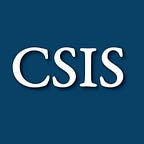CSIS Backgrounder on Germany’s Parliamentary Elections
Everything you need to know about the September 24 elections
Parliamentary Elections
24 September 2017
Merkel’s center-right is statistically tied with the center-left Social Democratic Party. A new far-right party, Alternative for Germany, has seen a recent decline in its popularity. Germany is an EU and NATO member, central to Europe’s foreign and economic policy and stability in the EU. Government formation may be challenging as smaller parties may or may not enter parliament.
Background
- Bicameral parliament, federal republic: Bundestag (at least 598 seats) and Bundesrat (69 seats).
- Bundestag elections every 4 years, proportional representation, voters cast two votes: one for a directly-elected representative in their district, and one for a party list in their Land (state).
- Parties must win at least 5% of the party list votes to enter Parliament, though parties with less than 5% can still claim their proportional allocation of seats if they win 3 directly-elected seats.
- Current coalition: Christian Democratic Union/Christian Social Union (CDU/CSU, Chancellor Angela Merkel’s parliamentary caucus) and Social Democratic Party (SPD), dubbed a “Grand Coalition” because these are the two largest parliamentary blocs.
- Bundesrat not up for re-election on September 24, as members are delegated from each of the 16 Länder, based on population and composition of state-level governments.
Contenders
- 38 registered parties, 6 are polling above the 5% threshold
- Establishment parties:
- CDU/CSU: center-right; fiscally conservative with social safety net; socially conservative; no immigration cap but favoring more deportations/returns and deals with third countries; pro-EU, open to Eurozone reform but not debt mutualization; pro-NATO, 2% of GDP spending by 2024.
- SPD: center-left; social-democracy, higher public spending; open asylum policies but focus migration on skilled labor; pro-EU, more integrated EU with coordinated economic policy; pro-NATO, questions 2% target despite agreeing to it as junior coalition partner.
- Free Democratic Party (FDP): free-market; socially liberal; tighter immigration laws, focus on skilled labor; pro-EU with ‘multi-speed’ Europe, open to Eurozone reform; pro-NATO.
- Alliance 90/The Greens (Greens): center-left; mixed “green” economy; socially liberal; open asylum and immigration policies; pro-EU, more integration, common economic policy; pro-NATO but focus on peacekeeping instead of increasing defense spending.
- Extreme parties:
- Die Linke (Left): far-left; economically interventionist with anti-capitalist wing; socially liberal; open asylum and immigration policies; pro-EU; wants to replace NATO with a Europe-wide security pact that includes Russia, end foreign deployment of Bundeswehr.
- Alternative for Germany (AfD): far-right; free-market, socially conservative; drastically narrow asylum/migration policy; limit EU to purely economic union, exit Eurozone; national self-sufficiency in defense, reduce tensions with Russia, Turkey out of NATO.
Impact on U.S. Interests
- Largest European economy; two-way trade in goods totaled $175bn in 2015; German foreign direct investment in the U.S. reached $255 billion in 2015 ($108 billion U.S. investment in Germany); U.S. affiliates of German firms responsible for over 670,000 U.S. jobs;
- Close intelligence, counter-terrorism, and military cooperation with United States;
- “Engine” of the EU: next government will tackle EU/Eurozone reforms that will impact its stability.
- 450 troops in Lithuania, leads NATO’s Enhanced Forward Presence there; 3rd largest contributor in NATO’s Resolute Support mission in Afghanistan (980); contributor to anti-ISIL coalition;
Key Issues to Watch
- Migration is the hottest electoral issue: Merkel has been criticized for her 2015 open-door policy. Number of asylum-seekers has dropped significantly in 2017; Merkel is actively trying to strike deals with third countries to increase returns and limit migration. Worsening German-Turkey relations have been highlighted.
- SPD has lost a substantial part of its support and has not won a federal election since 2005.
- German voters’ mistrust of President Trump casts a shadow on the campaign. Only 11% of Germans express confidence in President Trump to do the right thing in world affairs.
- Anti-U.S. sentiment is an inevitable factor in this election. SPD leader Martin Schulz has criticized President Trump repeatedly and has said he would ask the U.S. to withdraw any nuclear weapons stationed in Germany if he wins.
- The CDU/CSU, normally a stalwart transatlantic partner, has changed its platform reference to the U.S. from ‘most important friend” and “cornerstone of Germany’s international relations” in 2013 to simply “most important partner.”
- Potential Eurozone reform could play a role for voters who are wary of redistributing a German budget surplus to economically-troubled EU members; Merkel must balance EU reform proposals with fiscally conservative sentiments in her party, while Schulz calls for a dramatic increase in infrastructure and social spending.
Polling
Data source: INSA.
Photo credit: PASCAL GUYOT/AFP/Getty Images
Originally published at www.csis.org.
